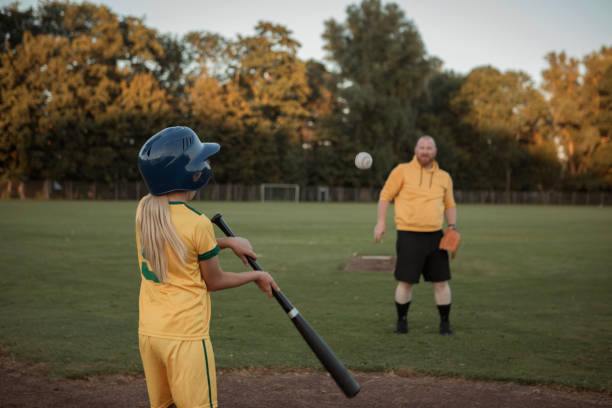Softball Drills: Enhancing Skills and Performance
Softball, a beloved sport played by millions worldwide, requires a combination of skill, strategy, and teamwork. Whether you're a beginner learning the basics or an experienced player honing your craft, incorporating softball drills into your practice sessions is essential for improvement and success on the field.
Importance of Softball Drills
Softball drills serve as the building blocks for skill development and team cohesion. They allow players to focus on specific aspects of the game, refining techniques and mastering fundamental movements. By repetitively practicing these drills, players can enhance their muscle memory, leading to improved performance during actual gameplay.
Benefits of Incorporating Drills
- Skill Enhancement: Drills target various aspects of the game, such as hitting, fielding, pitching, and base running, allowing players to develop and refine their abilities.
- Team Cohesion: Performing drills together fosters teamwork and communication among players, essential elements for success on the field.
- Confidence Building: Mastering drills instill confidence in players, enabling them to perform under pressure during competitive matches.
Types of Softball Drills
Softball drills can be categorized based on the specific skills they target. Here are some common types:
Hitting Drills
Hitting drills focus on improving batting technique, timing, and power. Examples include tee work, soft toss drills, and live batting practice against pitchers or pitching machines.
Fielding Drills
Fielding drills aim to enhance defensive skills such as catching, throwing, and fielding ground balls and fly balls. Players practice various fielding scenarios, including infield and outfield drills.
Pitching Drills
Pitching drills concentrate on developing proper pitching mechanics, accuracy, and pitch variety. Pitchers work on their wind-up, release point, and control through repetitive throwing drills.
Base Running Drills
Base running drills focus on speed, agility, and base-stealing techniques. Players practice sprinting, sliding, and reading signals from coaches to optimize their running efficiency.
How can players stay motivated during repetitive drill sessions?
Keeping drill sessions dynamic, incorporating competition, and setting achievable goals can help players stay motivated and engaged during repetitive practice sessions.
Essential Softball Drills for Beginners
For novice players, mastering the fundamentals is crucial. Here are some essential drills to kickstart your softball journey:
Tee Work for Hitting
Tee work allows hitters to focus on their swing mechanics and timing without the pressure of a moving ball. Players practice hitting off a stationary tee, ensuring proper form and contact with the ball.
Ground Ball Drills for Fielding
Ground ball drills help infielders develop quick reflexes and proper fielding techniques. Players practice fielding ground balls hit directly at them as well as to their left and right, improving their ability to react to different situations.
Pitching Mechanics Drills
Beginner pitchers focus on mastering the basic mechanics of pitching, including the grip, arm motion, and follow-through. Drills such as the "balance and reach" and "knee drill" help pitchers develop consistency and accuracy in their throws.
Base Running Fundamentals
Base running drills teach beginners the basics of running the bases efficiently. Players practice sprinting from base to base, rounding corners, and sliding safely into the base, learning when to accelerate and when to hold back.
Advanced Softball Drills for Experienced Players
Experienced players looking to take their game to the next level can benefit from advanced drills that challenge their skills and decision-making abilities:
Live Batting Practice
Live batting practice simulates game-like conditions, with pitchers throwing to batters while fielders are positioned in their respective positions. This drill allows hitters to practice reading pitches and making split-second decisions at the plate.
Situational Fielding Drills
Situational fielding drills replicate specific game scenarios, such as double plays, bunts, and relay throws. Players work on their positioning, communication, and decision-making under pressure, preparing them for game-time situations.
Pitcher-Catcher Communication Drills
Effective communication between pitchers and catchers is vital for success on the mound. Drills focusing on signals, pitch calling, and managing baserunners help pitchers and catchers develop a strong rapport and understanding of each other's roles.
Advanced Base Running Techniques
Experienced base runners practice reading the defense, anticipating throws, and taking calculated risks on the base paths. Drills such as rundowns, delayed steals, and sliding drills help players refine their instincts and execute aggressive base running strategies.
Importance of Proper Technique in Softball Drills
Maintaining proper technique during drills is essential for maximizing performance and preventing injuries. By emphasizing correct form and mechanics, players can avoid common pitfalls and develop habits that translate to success on the field.
Preventing Injuries
Poor technique during drills can increase the risk of injury, especially in high-impact areas such as pitching and base running. Emphasizing proper mechanics helps players stay healthy and minimize the likelihood of overuse injuries.
Improving Performance
Sound technique is the foundation of consistent performance in softball. By focusing on the fundamentals during drills, players can optimize their skills and perform at their best when it matters most.
Developing Muscle Memory
Repetitive practice of correct movements and mechanics builds muscle memory, allowing players to perform instinctively during game situations. By ingraining proper technique through drills, players can react quickly and effectively on the field.
Tips for Effective Softball Drill Sessions
To maximize the effectiveness of drill sessions, coaches and players should consider the following tips:
Focus on Fundamentals
Prioritize drills that target fundamental skills essential for success in softball, such as hitting, fielding, pitching, and base running.
Keep Drills Dynamic and Engaging
Incorporate a variety of drills that challenge players both physically and mentally, keeping them motivated and engaged throughout the practice session.
Provide Constructive Feedback
Offer feedback and guidance to players during drills, highlighting areas for improvement and reinforcing correct technique.
Incorporate Competition
Introduce competitive elements into drills to simulate game-like pressure and encourage players to perform at their best.
Incorporating Softball Drills into Practice Plans
Designing structured practice sessions that balance skill development with game strategy is essential for maximizing the benefits of softball drills:
Designing Structured Practice Sessions
Plan drills that progress logically from basic to advanced skills, allowing players to build upon their abilities over time.
Balancing Skill Development with Game Strategy
Incorporate drills that not only improve individual skills but also promote teamwork, communication, and strategic thinking necessary for success in competitive games.
Adjusting Drills Based on Team Needs and Goals
Tailor drill sessions to address specific areas of weakness or areas of focus identified by coaches and players, ensuring that practice time is used efficiently.
How often should softball drills be incorporated into practice sessions?
Softball drills should be a regular part of practice sessions, ideally integrated into every session to ensure continuous skill development.
Resources for Softball Drills
Coaches and players have access to various resources to enhance their softball drill sessions:
- Online Tutorials and Videos: Websites and video platforms offer a wealth of instructional content covering a wide range of softball drills and techniques.
- Softball Coaching Books: Written resources authored by experienced coaches provide comprehensive guides to designing effective drill sessions and improving player performance.
- Softball Training Equipment: Specialized equipment such as batting tees, pitching machines, and agility tools can aid in the execution of drills and enhance skill development.
Can drills be modified for players with different positions?
Yes, drills can be adapted to suit the specific needs of players based on their positions, allowing them to focus on skills relevant to their roles on the team.
Conclusion
Softball drills are essential for developing the skills, teamwork, and strategy necessary for success on the field. Whether you're a beginner learning the basics or an experienced player striving for excellence, incorporating drills into your practice routine is key to reaching your full potential. These baseball practice plans provide structure and focus to your training sessions, helping you improve in specific areas and elevate your overall performance on the softball field.






Comments
Post a Comment